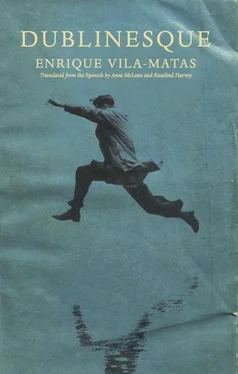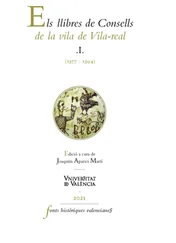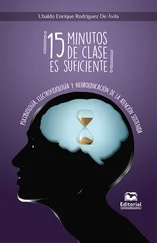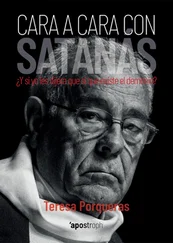What is a ghost? Stephen said with tingling energy. One who has faded into impalpability through death, through absence, through change of manners.
He remembers one day in this very place his maternal grandfather, Jacobo, saying with slightly forced emphasis: “Nothing important was ever achieved without enthusiasm!”
“Right then. And what have you managed to find out about Ireland?”
He doesn’t answer his mother straight away, he’s amusing himself too much looking around the living room. Suddenly, the voices start growing softer and considerably lower in tone, as if falling asleep, and finally, after a brief process of almost total disintegration, all that remains is the silence and the hazy smoke from some ghostly straggler’s cigarette. He thinks there couldn’t be a more opportune moment to tell his mother that Ireland is essentially a country of storytellers, full of ghosts of its own . He wants to give a weight to the word ghosts, winking at his mother, but it’s useless; for years now she’s pretended to ignore the subject of the family ghosts, probably because she’s spent so many years living in more than stable harmony with the specters and doesn’t want to argue about something as obvious as their gentle existence.
“Imagine,” he says to his mother, “that an Irish politician or bishop commits a terrible act. Fine. You’d want to know exactly how things had happened. Isn’t that right?”
“I think so.”
“Well for the Irish, this is secondary. What they care about is how the politician or the bishop is going to explain himself. If they’re able to justify themselves with grace, that is, with a gripping, human story, they’ll get out of their predicament without much trouble.”
Old age, illness, gray weather, centuries-old silence. Boredom, rain, net curtains cutting them off from the outside. The oh-so familiar ghosts of Calle Aribau. There’s no reason to try to play down his parents’ drama and his own; growing old is disastrous. The logical response would be for everyone who sees their life waning to shout out in fright, not resign themselves to a future of drooping jaws and hopeless dribbling, still less to this brutal tearing apart that is death, because to die is to be ripped up into a thousand pieces that are scattered dizzily forever, with no witnesses. This would be logical, but it’s also true that sometimes he feels pretty good listening to the soft, ghostly murmur of voices and spectral footsteps that lull him and which deep down, being so furiously familiar, even win him over.
“And what else do you know about Ireland?”
He’s about to tell his mother that the country is the closest thing there is to this living room. His father gently reproaches his wife for overwhelming their son with so many questions about Ireland. And before long they’re embroiled in an argument. “I won’t make you your coffee for two days,” she says. Senile shouts. The two of them have very different characters, different in every way. They’ve always loved each other, but for this very reason they hate each other. In reality they hate themselves. His parents remind him of something the poet Gil de Biedma once said to him in the Tuset bar in Barcelona. An intimate relationship between two people is an instrument of torture between them, whether they’re people of opposite sexes or the same. Each human being carries within himself a certain amount of self-hatred, and this hatred, this not being able to stand oneself, is something that has to be transferred to another person, and the person you can best transfer it to is the person you love.
When he thinks about it, the same thing happens with him and his wife. There are days when he feels like he’s lots of people at the same time, that his brain is peopled with more ghosts than his parents’ house. And he can’t stand any of these people, he thinks he knows them all. . He hates himself because he has to get older, because he’s aged a lot, because he has to die: this is precisely what he remembers very promptly every Wednesday when he visits his parents.
“What are you thinking about?” his mother interrupts him.
Old age, death. And not a single one of these normal net curtains can block the funereal view of a gloomy future, or the present. In the living room mirror, as he looks deep into his own eyes, he’s horrified to see, for a fraction of a second, Irish light inside his retinas, and in these, dozens of tiny different insects, moths of many varied species, all dead. It could be said that his eyes are like that mental cobweb seemingly reproduced by the terrifying workings of Spider’s brain. He is terrified, and looks away, but he remains petrified, frightened, on the verge of crying out.
He goes over to the window in search of a livelier landscape, and as he looks out at the world, sees a young man walking down the street quite quickly; just as he walks past, under the window, the man looks up at Riba with one irate eye and stares hard, softened only by his comical limp.
Who can this irate, limping man be? Riba feels he’s known him all his life. He remembers the same thing happened with the young genius who for so many years he dreamed he’d find one day for his publishing house. He always believed he was out there and that in fact he’d known him all his life, and then it turned out there was no way of finding him, as he either didn’t exist or Riba didn’t know how to find him. Would having found the genius have justified his whole life? He doesn’t know, but nothing would have seemed more glorious than to have been able to announce to the world that it wasn’t true that all the greats of literature were dead already. It would have been fantastic, because then he would have been able to abandon his quaint practice of referring to the lack of young geniuses by forever quoting — once drunkenly and now with all the serenity and treachery in the world — the first line of a poem by Henry Vaughan, which he knew full well was really about something else:
“They are all gone.”
When he looks back at the one-eyed man, he finds he’s no longer out there limping around. Maybe the irate, ethereal man has stepped into a doorway, but in any case the fact is he’s no longer there. How strange, Riba thinks. He’s sure he saw him a moment ago, but it’s also true that some of the people he’s come across recently disappear too fast.
He goes back to the living room and feels there’s no conversation left here, just a wake-like atmosphere growing ever more profound, the leaden air of a waiting room. Then, he doesn’t know how, he remembers something Vilém Vok said in The Center : “To have a mother and not to know what to talk about with her!”
He has to leave, he thinks, he can’t spend any more time in this house. If he does he’ll end up totally mute and buried, and days later he’ll be walking around sharing cigarettes with the ghosts.
“They are all gone, Mama,” he mumbles, head bowed.
And his mother, who’s heard him perfectly well, laughs happily as she nods her head.
The day he said goodbye to his vocation as a publisher seems very far off now. The thing he remembers most perfectly is that, after years of familiar, spectral silence, literature came to him alone, completely alone. How can he say it, how can he describe it? It’s not easy. Even if he were a writer it wouldn’t be easy to explain. Because it was strange, literature came to him lightly, with a graceful step, in red high heels, a cocked Russian hat and a beige raincoat. Even so, he wasn’t interested until he consciously confused literature with Catherine Deneuve, whom he’d recently seen in a trench coat, under an umbrella, in a very rainy movie that took place in Cherbourg.
“I don’t think you know anything about Dublin,” says his mother, interrupting his thoughts.
Читать дальше












